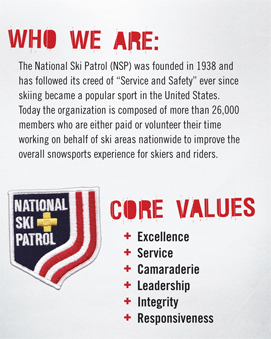Frequently asked questions to joining our patrol
What is the process for joining Patrol?
First thing you should do is contact the recruiter recruiter@wpsp.org and signal your interest. We’ll ask you to fill out a membership application form. If you are applying during ski season, we will encourage you to schedule a “ride-along” day at Willamette Pass Resort where you’ll have a chance to meet a few patrollers and see first-hand what we do. If you seek an Alpine Patroller position, you will be asked to sign up for a ski/snowboard test. An interview will typically be scheduled during the spring with our membership committee, and then successful candidates will be asked to sign up for first aid training.
What are the different positions available?
- Alpine Patroller: ski/snowboard with advanced skills, provide first aid care and patient transport.
- Patroller: ski/snowboard at varying skill levels, provide first aid care.
- Mountain Host: ski/snowboard at varying skill levels, focus on customer service.
- Ski Patrol Youth: high-school age, ski/snowboard at varying skill levels.
How much training is required?
All Patrol and Alpine Patrol candidates must enroll in National Ski Patrol’s Outdoor Emergency Care course, equivalent to an EMT Basic certification. This is typically offered in late summer/early Fall. Mountain Hosts are required to take an abbreviated version of this training called Outdoor First Care. All patrollers must complete ongoing additional training in CPR, and an annual 2-day refresher.
On-hill training begins for candidates at the start of the ski season, and includes all aspects of patrol duty required of the candidate after the first year. All candidates will receive training in the duties expected of the position they will be filling.
Do I have to be an expert skier to apply to Ski Patrol? What is the ski/board test?
The ski/board test is required for those who want to pursue alpine patrol, where patient transport using toboggans is part of the position description. We need skiers or snowboarders who are stable and confident anywhere on our mountain and have sufficient skills that they can learn to pull loaded toboggans down any of our terrain. For the ski/board test, we aren’t looking for perfect technique, but we do need to see competent skills in a variety of terrain.
Patrollers not pursuing alpine patrol don’t need to take the ski/board test, and may not have any skiing/boarding skills. Some patrollers prefer to spend their duty time at our patrol base focused on first aid. They are always welcome, but not required, to respond to injuries on the hill.
Mountain Hosts don’t need to take the ski/board test, and may not have any skiing/boarding skills. They are always welcome and encouraged to pursue time on the hill to develop their skills.
Do I need to do the first aid training if I’ve already got advanced first aid or medical credentials?
If you have one of the following credentials, and it is current and up to date, you can “challenge” the Outdoor Emergency Care course: EMT, Paramedic, RN, PA, NP, MD, and DO. We find that the first aid training we offer provides an important opportunity to develop the relationships needed for effective teamwork with other members of our Patrol, so even if you have an advanced medical credential we highly encourage you to take the OEC course.
What is the time commitment for ski patrol?
Beyond the typical 15 days of patrol duty expected during the ski season, patrollers are expected to participate in off-hill activities including in-town training events and patrol fundraisers such as the annual Ski Swap in October and the Waldo 100K UltraMarathon race in August.
What’s a typical duty day on Patrol?
After the required training is completed, patrollers will be assigned duty days. Volunteer patrollers generally serve two weekend days out of every three weekends, for a total of about 15 duty days over a normal season. Patrol days start before 8:00 a.m. and continue until 5:00 p.m. unless a search and rescue mission requires after-hours duty. Paid patrollers are scheduled for duty on weekdays and holidays.
What are the benefits offered to ski patrollers?
The principal benefit to the individual patroller is the satisfaction of working with a team of snow sports enthusiasts who are committed to the safety and enjoyment of the sport by the public we serve at Willamette Pass Resort. In addition, the patroller and his/her immediate family can expect to have free use of the Resort’s lift services, including on days when the patroller is not on duty. There is a discount for patrollers on food purchases in the lodge, and the patroller’s family may use the Patrol’s Family Room while at the Resort. Patrollers also enjoy significant discounts on equipment purchases from selected vendors.
Do Patrollers get paid?
Depending on the needs of Willamette Pass Resort, there may be a few paid patrol positions for weekday duties. Paid patrollers work as employees of the Resort and have additional application requirements and selection criteria.
How much does it cost to join Patrol?
Expenses for ski patrol candidates in the first year include approximately $150.00 to take the OEC course and buy the textbook, and to cover other training materials. In addition, all patrollers pay National Ski Patrol dues of about $75/year. Uniform parkas are provided on a cost-sharing basis for $50 upon completion of training. Radio harnesses, vests, and first aid packs must be purchased and initially stocked at patroller expense. All patrollers are required to have personal health insurance.
